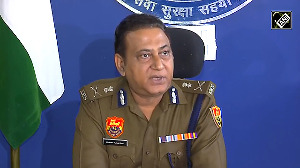"Where is the help? Where are the authorities? We have nothing. We are living under the open sky, alone," cried Arshad Nawaz, whose 10-year-old niece, Sitra, was killed in this weekend's devastating temblor.
Nearly three days after the earth convulsed beneath a girls' high school, residents were still trying to reach the children buried within with no rescue dogs, sound sensors or soldiers.
There is growing frustration among those effected by the earthquake that not enough is being done to help them, but international relief officials say things are improving and criticism of the overwhelmed Pakistani government is premature.
Until Sunday, not a single road into mountainous Pakistani-controlled Kashmir was passable, meaning no aid reached the hundreds of thousands of homeless until Monday, said Andrew MacLeod, Humanitarian Affairs officer with the UN Coordination and Assessment Team.
"In situations like this, aid never gets through quickly enough, but it is getting through as quickly as possible," he said. "Katrina proved that even the biggest country can be swamped by a natural disaster."
MacLeod said the international community had learned a valuable lesson from recent disasters like Katrina and last year's Asian tsunami: "You need to coordinate. There's no point running off and doing everything on your own."
Anne Veneman, executive director of UNICEF, said her teams were working around the clock, and that aid is now getting through.
"We've got teams of people who have been working all through the weekend, deploying resources. We have the first shipments that have now reached the most affected areas. We know they are reaching the children and the people, the families who need them," she said.
The Pakistani government has called for and accepted aid from every corner of the earth, including India, with some hailing the thaw as an historic opportunity to work toward lasting peace in the region.
But such optimism has been little comfort to those left homeless, widowed and orphaned. Between 20,000 and 30,000 people are said to have died in the quake, with hundreds of thousands left homeless.
"We've been waiting since this happened. We've received nothing. Our house is gone. Everything is gone and I have no work. I am broken," said Mohammed Nasir in Muzaffarabad, three days of stubble on his face, and a sign in his hand pleading for help.
Khursheed Kiyani, who has been living outside in Muzaffarabad since the quake hit Saturday, expressed anger at the relief effort.
"It is like living in hell here. The Chinese, the French-- everyone is supposed to be helping us, but we don't see any of it. We see the helicopters but we don't see any food. Where is the relief effort?"
Some criticism focused on the government of Pervez Musharraf, the military president who controls Pakistan's vast armed forces. The military has been coordinating the relief effort, along with non-governmental organisations and the international community.
In normal times, the government bans foreigners from setting foot in Kashmir without prior permission, but it has greatly relaxed the rules to allow a flood of international relief workers into the area.
In Indian Kashmir, the aid effort was spearheaded by the government and the military, although some local aid agencies also pitched in. The government has provided tents, blankets, food and medical supplies, most of which were airdropped by military helicopters.
Government and army units have set up makeshift hospitals and shelters for the injured and homeless. International aid agencies like the ICRC are not allowed to carry out work in the region due to security concerns, and have to work through local Red Cross units and other volunteer organisations.
Several neighbourhood groups in Srinagar collected money, warm clothes and blankets for the survivors and are also receiving voluntary donations from residents.
In Garhi Habibullah, Nawaz's fingers blistered from the clawing at the earth that entombed his young niece. His pale yellow salwar kameez was stained with sweat.
"I don't have any other clothes. Everything else was buried when my home collapsed. I haven't seen any help." Nawaz clung to a small plastic bag with barely one kilogram of flour. "This is to feed a family of 12, my brother's children, mine and my sister's."
On a rickety old wooden table more than a dozen tiny backpacks were stacked high. On the sad heap was a small black and orange bag with a bright yellow tweety bird swiping hard at his yellow golf ball.
Tucked by its side was a small boy's bag with the giant Nike symbol and emblazoned with the words "Just Do It" barely visible beneath the gray cement dust.
Creeping slowly, hesitantly toward the mound were two young girls. They looked about 15 and 16 years old. Faisa and her sister Sadia Aurungzeb hadn't been back to the school since Saturday's earthquake. Both of them had escaped-- barely.
Sadia wrapped her yellow and red shawl close around her shoulders. "It all happened so fast. We were waiting for the teacher and we were about to start our Islamiat class. Suddenly everything started to shake. We screamed and quickly we began to recite the Quran. I was so scared. I just kept repeating every prayer I could remember. I grabbed my friend's hand and we ran out."
The Pakistan military says it is still waiting for some helicopters from the Untied States to come to the area.
"We were expecting the helicopters. Maybe they will come on Tuesday," said Brigadier General Ashraf Tabbassam, at Muzaffarabad, the capital of Pakistan-occupied Kashmir.
"It is a massive disaster. With a disaster of this magnitude it takes some times to reach out to people," said Tabbassam.
He said the military has conducted a staggering number of helicopter sorties trying to reach the hardest hit regions that are tucked away in the Himalayan foothills and reachable only by air.
"We have never had to tackle anything of this size before. And the world has made a lot of promises."
At the city limits of Muzaffarabad on Monday, several families stood on the road that snaked down the mountain holding signs they had their educated relatives write in English. One said simply in large blue letters: "HELP". Another asked: "Who will help us?"
Editor's Note: Paul Haven in Islamabad, Pakistan contributed to this report.






 © 2025
© 2025